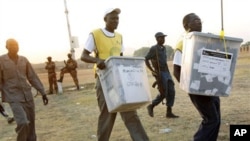South Sudan's minority leader in parliament, Onyoti Adigo Nyikwak, on Tuesday spoke out against the government’s plans to hold elections in June, saying the move would enflame tensions and further divide the country.
"When people talk about elections now, it means you are inviting more fighting," Adigo told reporters in Juba.
"Elections should be when there is peace and tranquility... after we have built trust amongst ourselves. Elections are when we forgive one another. Elections are when we make accountability to those people who have committed atrocities so that we are able to work together. So the government should not talk about elections at this time when the country is burning,” Adigo said.
The government last month announced that it has approved a budget of 1.5 billion South Sudanese Pounds ($517 million) for elections, in which the presidency, state governorships, and all of the seats in the National Assembly will be decided. Last week, the chair of the National Election Commission set June 30 as election day.
Information Minister Michael Makuei has said South Sudan's transitional constitution stipulates that elections must be held this year.
But the constitution says the term of the president "shall be four years, commencing from July 9, 2011." It also says when the presidential term expires, the presidency will be considered vacant and the position will be temporarily handed to the vice president, "pending the filling of this position within 14 days."
The government should not talk about elections at this time when the country is burning.South Sudan parliamentary minority leader Onyoti Adigo
National dialogue
Adigo said instead of holding elections, a national dialogue should be held among leaders from across the spectrum of South Sudan politics and civil society. He said participants in the dialogue would decide how the country should be led when the terms of the current government and president expire.
“Whatever they agree can be brought to parliament for blessing. But it is not for parliament to extend" its own or the president's term, he said.
The parliament's minority leader made these remarks amid reports of renewed fighting in Unity and Upper Nile states. He said neither side in South Sudan's conflict, which is now in its second year, appears to have the political will to end the fighting.
Against the vote
Other opposition leaders have spoken out against holding the elections while fighting continues in parts of South Sudan.
Opposition leader Lam Akol said the money the government has earmarked for the vote would be better spent helpin the millions who are food insecure or living in camps for the displaced.
Former political detainee Ezekiel Lol Gatkuoth, who is now deputy foreign affairs secretary in Riek Machar's rebel movement, said holding elections when millions of people are suffering would be unacceptable. He added that insecurity around the country would make it impossible to organize a safe and fair vote.
"It is actually the joke of the year," Gatkuoth told South Sudan in Focus earlier this week.
In May, President Salva Kiir said there would be no general election "... in 2015 because reconciliation between the people will have to take time." He said South Sudan would have an interim government during the reconciliation process. A month later Mr. Kiir insisted that there would only be a transitional government if he were its leader.






